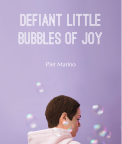Everyone says “I Love You”
“I love you” sneaked up on me. I remember being concerned when it popped up in the culture years ago. It felt too intimate a sentiment to be slung about so casually. To me it was more appropriate for song lyrics, or for those times when one imprudently overestimates the significance of a romantic encounter. I dismissed the “I love you” vogue as quaint, a bit precious, definitely too much information for passers-by to be offering.
Then it was everywhere. Now everyone says “I love you.”
For people like me, “I love you” is not easy to integrate into our dialect: People who prefer minimal displays of affection, public or otherwise; who were taught not to cry (not because boys don’t cry, but because others will assume you’re having a stroke); who were told to keep tantrums private so that image of your hysterical self remains between you and the mirror.
I tried to catch up with the loving culture, and at the beginning it was like learning a different language. I could understand what people were saying, but I couldn’t formulate words in response. Someone would close a conversation with “I love you” and I was suddenly searching for syntax and conjugations. Often I was stymied and would answer incoherently, as if someone had asked me in French if I wanted more tea and I’d answered that Sylvie was at the pool. I often gave up and responded with what was least resistant to my mind: “Thanks.” I also utilized “Great!” and “Take care!” And once I even drew from my catholic background when responding to a dinner guest’s “I love you” sign-off with, “And also with you.” The message-receivers flashed brief, quizzical looks of offense at my dissembling replies. And probably rightfully so. What was my deal? Politically the world has been a mess since Dan Quayle, but if the culture was popping with love, who was I to fight it? So I rehearsed the words to get used to them, and repeated them all over the house, to my washing machine, my microwave, once even to a razor cartridge I thought I’d lost.
Then I transferred this new and quite foreign language to mammals of my own species. My spouse should have been an easy one, but even as I said the words aloud I kept thinking, doesn’t he already know? We’re married after all, and one doesn’t enter into an impossibly huge mortgage with just anyone. Why would he have to be told? But I decided the best practice was to flood, so out it came, to him and then to relatives and then friends. I couldn’t quite get the whole sentence out, but I used “Love ya” with a big exclamation point. I ended every conversation that way. I became a new, more open, less inhibited me. I hate to admit it, but I actually started to feel more optimistic and positive in my daily outlook on life.
I should have planned for a backlash. My urologist, for one, did not need to know that I loved him. Neither did librarians or cafeteria workers or the mother-daughter team that cleaned my house. And when I saw the mayor at a coffee shop and confronted her about the pothole problem in the city, it was clearly tone deaf of me to end my rant with “Love ya!” I don’t think any of the aforementioned took my loving them as a come-on, since I didn’t follow them out the door begging for a commitment, but the affection was misdirected and they all knew it. Having not learned the unspoken filters for this verbal love, I stopped altogether.
Now I reserve “I love you” for audiences where my lack of discretion will do the least harm, and my emotional limitations won’t be stretched: Babies and dogs seem to really appreciate it, as they do anything not said harshly. And my houseplants thrive on the words, pumping out oxygen in little hearts.
